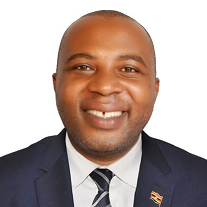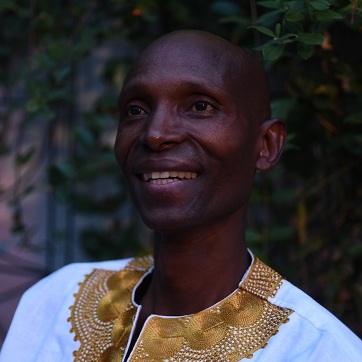Date
17th - 19th November 2021
17th - 19th November 2021
30th September, 2021
Journal of Nutrition & Dietetics
KNDI invite all professionals, scholars, government departments, students, junior researchers and senior researchers from all parts of the world to participate in the 2nd International Nutrition & Dietetics Scientific Conference by JND
The Theme of this conference is “Nutrition as a Key Pillar in Universal Health Coverage (UHC)”
Participation shall lead to award of CPD points for KNDI professional practitioners. Deadline for Abstract/Symposium Submission is 30th September 2021
The Conference shall be held at the Kenya Nutritionists & Dieticians Institute Headquarters from the 17th to the 19th of November 2021, and the pre-conference workshops shall be held on the 15th & 16th of November 2021. KNDI Headquarters is Located in Mavoko Sub-county, along Mombasa Rd 800m from Signature mall, between Mlolongo Valley View estate and Kenchic.
Kenya Nutritionists and Dieticians Institute (Nutritionists and Dieticians Act 18, 2007) is established under (Cap 253B) as a professional regulatory agency on matters related to Nutrition and Dietetics in Kenya. Under section 6(e) of the Act, the institute is to research into and provide public education on Nutrition and Dietetics issues in Kenya and beyond. This core function can only be achieved through a platform where researchers from different parts of the world share their latest research outputs that would drive the agenda for nutrition education. In order to spearhead the dissemination of innovative scientific knowledge in the field of Nutrition. KNDI will have its second scientific conference in November 17th to November 19th 2021. The Theme of this conference is “Nutrition as a Key Pillar in Universal Health Coverage (UHC)”
Malnutrition is a major public health concern. This includes both over and under-nutrition. Under-nutrition remains a major threat to the survival, growth and development of children. Globally, 165 million children under the age of five are estimated to be stunted and 45% of child deaths are attributable to undernutrition. Overnutrition characterized by non-communicable conditions and diseases, is a growing problem in both developed and developing countries (including Kenya). Leading to the triple burden of malnutrition. Yet nutrition is still a neglected area in public health The setting up and implementation of UHC policies in many developing countries, combined with the increasing interest from UN agencies, SUN Movement and donor(s) towards this approach, represents an important opportunity for nutrition to be part of national health policies. KNDI has organized their 2nd International Conference in Nutrition and Dietetics between the 17th to the 19th of November 2021, to be held at the Kenya Nutritionists and Dieticians Institute to bring together different professionals and key players of nutrition to discuss & review the role of nutrition in UHC through scientific sharing.
To bring together the community of practitioners in Nutrition and Dietetics for knowledge sharing and discussions as part of scaling up the nutrition agenda globally.
This conference shall be guided by the following objectives:
The conference will be an opportunity to ensure that nutritionists and dieticians are kept abreast of the new developments in preventive as well as curative services and will enable professionals to earn CPD points as per this link
| Activity | Number of CPD points |
|---|---|
| Attendance of the Conference for one day | 2 points |
| Attendance of the Conference for two days | 4 points |
| Attendance of the Conference for three days | 6 points |
| Attendance of the Pre-Conference Workshop | 1 point per workshop |
| Key note Speakers | 8 points |
| Oral and Poster paper presentations | 5 points |
| Principal author of a published paper | 10 points |
| Co-author of published paper | 6 points |
The conference shall have different fees for both virtual and physical participants as shown below

| Students | |
|---|---|
| East Africa | 1,500 (15 USD) *limited to certificate, diploma and degree students who are yet to register as a professional |
| Non East Africa | 3,000 (30 USD) |
| Professionals | |
| East Africa | 3,000 (30 USD) |
| Non East Africa | 10,000 (100 USD) |

| Students | |
|---|---|
| East Africa | 7,500 (75 USD) |
| Non East Africa | 20,000 (200 USD) |
| Professionals | |
| East Africa | 10,000 (100 USD) |
| Non East Africa | 30,000 (300 USD) |

| East Africa | 5,000 (50 USD) |
| Non East Africa | 10,000 (100 USD) |

| Silver | 25,000 (30 secs Clip) |
| Gold | 35,000 (60 sec Clip) |
| Platinum | 50,000 (2 min Clip) |
| Diamond | 150,000 (5 Min clip) |
Mpesa paybill no 975775; Account No; Conference 2021#
Bank Details
Bank name: Co-operative Bank of Kenya
Account Name: Kenya Nutritionists & Dieticians Institute
Account Number: 01128125024600
Swift code: KCOOKENA Purpose: Conference 2021#
There will be 5 Keynotes

Dr. Okeyo has over ten (10) years’ experience in public health and nutrition research as evidenced by over 51 numerous peer reviewed research publications with records from the year 2007 to date. Along with this he has had over 10 years’ experience in Nutrition and Health research and Programming support. He is currently supervising a number of postgraduate research projects across four public and private universities in Kenya. Currently he examines for the College of Medicine at the University of Malawi and in addition to postgraduate mentorship at Nelson Mandela University in South Africa. He has good skills and knowledge on quantitative techniques in conducting complex health related researches from a multidisciplinary perspective. He has built a wealth of skills in population-based researches at community and national levels through action research consultancy work for a number of international organizations. Okeyo is holder PhD in Community Nutrition and Development and a post-doctoral Master of Science in Public Health. He was an African Doctoral Dissertation Research Fellowship (ADDRF) scholar sponsored for PhD by African Population Health Research Centre and IDRC. Currently, he serves as Chief Executive Officer for the Kenya Nutritionists and Dieticians Institute (KNDI) which regulates the training, practices and research among nutritionists and dieticians’ professionals. His has previously worked as head of department for nutrition and health at Maseno University and leading programming, monitoring and evaluation consultancies. He has served in this capacity for 5 years and now the final 5-year phase as a CEO after renewal of contract based on observable performance records. He has had a previous experience with East, Central Southern Africa-Health Community programmes as a consultant for dissemination of model nutrition curricular for Tanzania, Kenya and Uganda where he had an opportunity to interact with NCDs, Food Security and Nutrition programmes. His dream is to facilitate a work environment characterized by good programming, research that informs wider audience through harmonized high-quality sharable publications on nutrition issues at community, national level and regional levels. Dr. Okeyo has given Keynote address in a number of conference in Kenya, Finland, UK and attended many conference in Oslo, Canada, South Africa, Nigeria, USA among others.
Adequate nutrition during infancy & early childhood is fundamental in the growth & development of a child. This is particularly critical during the first 1000 days of life. It appears that complementary feeding phase is the peak age for growth faltering, deficiencies of certain nutrients and common illness such as diarrhea. This keynote address will detail two critical parts of complementary feeding. The first part will deal with initial guidelines of complementary feeding while the second part will deal with the role of fortification on child growth and development. The keynote paper is aided by detailed synthesized literature and systematic review of previous guidelines and studies. It apparent that there appears to be increasing evidence of the relationship between infant feeding practices and growth during infancy. Effective complementary feeding has demonstrated an observable positive effect on the linear growth of a child within the first 24 months of life. It appears that improved complementary feeding is directly proportional to the linear growth of a child. Fortification of commonly used food vehicles provides an opportunity for increasing nutrient intake during infancy and has the potential to improve growth and development dimensions. The result based on a systematic review of articles which met the minimum selection criteria identified milk, iodine, maize meal porridge, and vegetable oils as recurring fortification vehicles in the context of complementary feeding. A significant impact of fortification on linear and cognitive growth was demonstrated recurrently across the included empirical studies. However, the review reflects outcomes that still do not demonstrate direct cause and effect relationships but rather implied meaning in the relationship matrix.

Prof. Gresse is the head of dietetics at Nelson Mandela University, Stellenbosch, Western Cape, South Africa. She is a holder of D Sc (Dietetics): Potchefstroomse Universiteit vir Christelike Hoër Onderwys, 1991. Previously she has been the Academic Dean at the Private Hotel School, Stellenbosch; Consultant for The Private Hotel School and the Educational Institute for Service Studies International; Academic Director at the Educational Institute for Service Studies International, Port Alfred a Private Higher Education Institution that offers a B Com in Hospitality Management; Head of the Department of Food Service Management, Faculty of Health and Food Technologies, Technikon Northern Gauteng and Senior Lecturer- Department of Human Nutrition at MEDUNSA. She has reported on research projects at 18 national and international conferences in South Africa and was the main speaker at six different symposiums and offered many workshops at conferences and attended and participated in many workshops and conferences. She was involved in a number of educational development projects and was part of the team of the Technikon Northern Gauteng to obtain and manage Nuffic funds for development and was involved in the development of ten new educational programmes. She has also attended the Leadership Effectiveness Advancement Programme of Nelson Mandela University. Since 1985 she has been involved in more than 30 projects of a nutritional/dietetic or educational matter and published over 20 articles in peer reviewed journals.
Malnutrition persists among large sections of the population and the epidemics of obesity and micro-nutrient deficiencies are on the rise. The environment and quality and quantity of food are key factors to affect the health of a population. As nutrition transition takes place, more people eat foods that were prepared away from home, foods that are often highly processed. In the process, taste changes to include more refined, sugar filled and high fat and energy products that may not have a high vitamin and mineral content. There are many developments and strategies used to improve the food and nutrition situation, alleviate hunger and ensure sustainability, and we should keep these in mind and contribute to the search for the ideal balance in modernization while maintaining a healthy lifestyle. Some will be discussed. Modern nutrition science is young. Recent studies have shown that foods and diet patterns rather than nutrients explain many effects of diets on disease. Nutrient density and dietary diversity are the focus of research nowadays. This has implications for food producers, marketers and retailers as the acceptability, labelling and costs of the food are important aspects to take into consideration in changing the public’s perception about food. There is a growing awareness of the potential for food and diet modifications that can support health and reduce the risk of disease. Nutrigenomics is an emerging field that investigates the interrelationship of fields such as nutrition, molecular biology, epidemiology and medicine. It helps to understand the complex metabolic networks that can lead to solutions for undernutrition, metabolic syndrome and its complications. There are unprecedented developments in agriculture and technological innovations that enable improvement in food production to prevent famine, but these come at a great cost as agriculture is a major cause of global environmental degradation. Governments take the current situation into consideration and plan for healthier food environments. Nutrition policy and planning should prioritise food based dietary targets, communication of evidence based nutrition and the integration with other developmental strategies in order to ensure sustainability and improvement in hunger.

Dr Martin Mwangi is an award-winning Nutritional Epidemiologist and a Senior Research Fellow at the Training and Research Unit of Excellence (TRUE), College of Medicine, University of Malawi. Previously, Dr Mwangi worked as a Research Scientist at Wageningen University - The Netherlands. He is also a Guest Lecturer at The Royal Tropical Institute, Amsterdam, The Netherlands, and Maseno University, Kenya. Dr Mwangi's research focus is on anaemia and iron deficiency, especially during pregnancy and early childhood. Dr Mwangi is currently the Team Leader and co-principal investigator of several ongoing research projects in Africa. He has previously successfully conducted clinical trials in Kenya, Malawi, Nigeria, and the Netherlands as the lead researcher on the ground or the principal investigator and collaborated on numerous clinical trials worldwide. Dr Mwangi has mentored many MSc students, including a few PhD fellows. Dr Mwangi has won many research awards and travel grants, including the prestigious Wageningen University Research Award. Dr Mwangi is a member of the African Nutrition Society, the American Society for Nutrition and a fellow of the African Nutrition Leadership Programme (ANLP).
The epidemiology of iron deficiency anaemia in sub-Saharan Africa differs from that in other parts of the world. The low-quality diets prevalent in this region are a poor source of iron. The population is also frequently exposed to infection, and demographic characteristics result in a greater prevalence of people at high risk of iron deficiency anaemia than in other parts of the world. The keynote will focus on the causes, disease burden, and consequences of iron deficiency anaemia in the general population in this region and current policies and interventions for its control. The current debate is dominated by concerns about the safety of iron interventions, namely regarding its effects on malaria and other infectious diseases. However, universal antenatal iron supplementation and delayed cord clamping are safe interventions and stand out for their potential to improve maternal and infant health. Effective infection control is a precondition to safe and efficacious iron interventions in children. Greater emphasis should be given to approaches aiming to reduce iron loss due to helminth infections and menstruation, alongside interventions to increase iron intake. The keynote will conclude by delivering key messages for pregnant women, adolescent girls, non-pregnant women, children, and the general population.

Dr. Evayline Muthoni Nkrigacha is a nutrition Scientist and currently holding a PhD IN Applied Human Nutrition of the University of Nairobi. Dr. Nkrigacha is the current sitting Chairperson of Kenya Nutritionists and Dieticians Institute(KNDI) and lecturer in the Department of Nutrition and Dietetics at Pwani University Kenya. Dr. Nkrigacha research focus is built on improving nutrition status of lactating mothers. Her research is founded on improving low income population using urban agricultural skills. Dr. Nkrigacha has previously been an agricultural officer deployed as Sub-county officer. She has published a number of peer reviewed articles in reputable Journals. She has had international opportunity as a guest lecturer at Seinäjoki University of Applied Sciences in Finland. Recently she was part of the research team reviewing Royco Mchuzi Mix product in relation to common health claims in Kenya on behalf of Unilever Kenya Company limited.
The keynote will focus on diet for lactating mothers in the context of breastfeeding. Lactating mothers are more vulnerable to malnutrition than their non-lactating mothers’ counterparts world-wide. Nutrient intake is the most critical determinants of the nutritional status of lactating women and their health and wellbeing. Poor nutrition places mothers and their children at a higher risk of mental health, disease and death. This is a period of higher nutrients demand and may cause a nutritive burden to lactating mothers. Therefore, lactating mothers’ diet should be increased at a rate of energy intake at 25%, protein intake at 54% and other nutrients like calcium, iron, zinc and vitamin A. The dietary practice of lactating mothers determines the quality of food consumed during lactation and the amount and quality of milk produced by the mother for the infant. Majority of lactating mothers do not change their previous food intake habits (quantity, quality and diversity) during lactation which is in contrast to the recommended amount they are required to take to sustain lactation. Lactating mothers’ dietary interventions focus on the adjustment of personal practices and habits. Adding nutrients to staple foods (fortification) and supplementation (provision of individual or mixtures of nutrients separately) with the aim of increasing nutrition and health outcomes. These interventions take place in a specific setting and are categorized as situational health actions. Finally, breast milk is the optimal nutrition with no substitute for an infant. Exclusive breastfeeding for the first 6months of age provides huge benefits for both infant and mother. However, its practice is affected by several factors attributed to mothers, family, and society and health service providing institutions.

Peter Milton Rukundo is a 40 years old Ugandan. He holds a Doctor of Philosophy (PhD) in Human Nutrition from the University of Oslo Norway and a First-Class Bachelor of Science in Human Nutrition and Dietetics from Kyambogo University, Kampala, Uganda. Currently he is a Lecturer and Postdoc Research Fellow at Kyambogo University in the Department of Human Nutrition and Home Economics with research affiliation at the University of Oslo, Norway and Michigan State University, USA. His research has evolved around the human right to adequate food, food insecurity, nutritional assessments and food systems among others. He is an Executive Committee member of the Nutrition Society of Uganda and National Multi-Sectoral Technical Committee on Nutrition. Through his participation in various national forums, Peter has supported the development of nutrition related policies, strategies, action plans, advocacy and assessments in the country and beyond. He has also undertaken expert consultations on national development assignments especially on school feeding, nutrition education, food systems and school milk programming among others.
African is endowed with a diversity agro-ecological zones and indigenous food systems that deliver wholesome foods rich in essential nutrients, dietary fibre and low in refined sugar and fats yet the continent continuous to receive millions of dollars and tonnes of relief food year in year out, an impression there is no end in sight soon to the food systems and malnutrition crisis. The African Union Summit has over time committed to accelerate agrifood systems transformation to reduce poverty, improve food security and nutrition. The most recent 2014 Malabo Declaration 1 came with the theme: “Accelerated Agricultural Growth and Transformation for Shared Prosperity and Improved Livelihoods’ with goals including ending hunger, halving poverty and reducing stunting to 10% and on the Continent by 2025. It also called on Member-States to double investment and enhance financing of the agriculture sector by allocating at least 10% of public expenditure to agriculture. However, half the countries in Africa have zero or negative growth in spending on agriculture, 2 and the burden of malnutrition remains 1 African Union (2014). Declaration of the 17 th AU Summit. Malabo: African Union. high. Estimates in 2020 indicated that up to 281.6 million Africans (21%) were undernourished with Eastern Africa contributing 125.1 million (28.1%). 3 Furthermore, the continent contributes 74% of the 3 billion people who cannot afford healthy diets. In effect, malnutrition costs economies between 3 and 16% of GDP annually. 4 Stunting in Africa also reduced minimally from 34.5% in 2012 to 30.7 in 2018. 5 This situation complicates the path towards the African Union targets for 2025 as well the attainment of the Sustainable Development Goals (SDGs) by 2030. The uncertainty is partly driven by the failure to harness productivity and value addition to reduce wide-spread poverty and inequalities that have perpetuated hunger and undernutrition. In some countries, the problem has been entrenched by decades of conflicts, political instability, military coups, poor governance, corruption and resource mis-prioritisation.
There will be 5 pre-conference workshops

Njathi Kabui is an eclectic Chef with a passion in Food Justice, a Leading expert in Food Literacy, a Medical Anthropologist and an Organic farmer. He is actively involved in promoting Food Literacy as a public speaker, a blogger, an author and a social commentator. Chef Kabui considers himself as an organic chef, who has intentionally designed his own disruptive cuisine. He calls this cuisine, “Afro Futuristic Conscious Cuisine” which promotes a mix of indigenous and healthy foods for the sake of sovereignty, health and food justice. Chef Kabui makes a case that the best of African food is in the future. He has promoted this cuisine in far flung places such as Africa, Europe, USA and in the UAE. His cuisine has been discussed at various events in Educational Institutions, Corporate companies, Nonprofits and Embassies. He has also done residencies or lectures at universities such as at Duke University (2019), University of Cape Town (2021), Rutgers University (2018) and the University of Michigan, USA in 2017, where he gave a Keynote address on, ‘The Influence of African Food in World Cuisine’. He also worked with the students on the issues of Food Justice and Equity in their careers. His residences are designed to share his time with students in classes, working with campus dining services where he prepares his recipes along with the campus chef for the students to taste. Chef Kabui has presented at numerous conferences and panels such as U.N Food Systems Summit (2021), Africa Week in Berlin (2020), SOAS Food Summit in London (2019), The Smithsonian (2018) in Washington D.C. He is also a notable Public Speaker at various gatherings such as keynote addresses at BCAGlobal in New York (2020), the Males Place (2018), CFSA (2020) in North Carolina and Alliance of Leadership Fellows (2021). He has also given social commentaries and his work featured on TV, Radio, Magazines and Podcasts such as; Public Broadcasting Services Television(PBS) USA, National Public Radio (NPR), Inooro Radio (Kenya), Anthropology Now (American Anthropology Association annual publication), The Internationalist (UK), Magazine Internazionale (Italy) and Ukombozi Review (Kenya).
Chef Kabui wishes to quote Thomas Sankara, the late president of Burkina Faso, who once said, “Don’t ask where neocolonialism is, it is on your plate”. His key note would bring to light the fact that food is at the foundation of any healthy society. It is also the basis of any form of sovereignty. A society has to be well fed and food-secure before it can have dreams and aspirations of liberation. Hunger is the only naturally occurring disease, all one has to do is wait and they will suffer hunger unless they have an adequate source of food. The question of food acquisition is as old as man. It is the main course of most wars in history and also the course of migration. It was the first form of currency as people engaged in barter trade. Finally, the current world geography has a lot to do with the search for spices and greener pastures. The United States of America was first founded as Christopher Columbus was trying to find a shorter route to India in order to buy spices. Once the settlers in the new world were able to successfully subdue the indigenous people in the new world, they engaged in agriculture. The successful acquisition of food allowed the new world to have big dreams about global dominance. Africans were drawn into the slave trade in order to work the land and produce power from the harvest of the land. The cotton from the American South provided Britain with cheap cotton that led to the first industrial revolution. Many of the current global power of today can trace the source of their power in the era of the slave trade. One of the tools they nations of the west are using to maintain their dominance is food. We have to ultimately design our own system with food at the base. The workshop will look at how we can analyze our food culture in light of our political situation, the quality of food we have in our country and the type of dream we have in regards to food. The three above components are key to understanding food justice. Further there will be an attempt to demonstrate that there cannot be any nutrition or health care with a food that is devoid of justice. The most obvious predicaments in achieving stated goal of nutrition and universal health care would include issues of corruption, neocolonialism and lack of food literacy.

Alice Ojwang holds a PhD in Dietetics from the Centre of Excellence for Nutrition, North-West University, South Africa. She has more than 20 years of experience working in Nutrition and Dietetics, specifically in preventing and managing obesity and related risk factors. She has been instrumental in shaping the direction of the Dietetics profession in Kenya. She works as a Practitioner, Health Promoter, Researcher and Mentor. With a Doctoral degree in dietetics, her areas of focus include dietetic related research and health education/promotion in obesity and metabolic syndrome, diet and its influence on women’s economic empowerment, the economic burden of obesity and its related risk factors, the impact of diet on health as well as prevention and management of chronic conditions. She continues to mentor young nutrition/dietetic professionals in Africa and share herself to grow professionally with her peers. She is a lecturer at the Department of Human Nutrition and Dietetics at the Technical University of Kenya, Nairobi-Kenya. “Taking drugs without eating healthy is like washing hands and drying them in the dirt”, Anonymous
At the dawning of the third millennium, non-communicable diseases are sweeping the entire globe. There is an increasing trend in developing countries, where the Nutrition and epidemiological transition imposes more constraints on dealing with the double burden of infectious and non-infectious diseases (Kushitor & Boatemaa, 2018; Min et al., 2018; Perez-Escamilla et al., 2018). Therefore, preventive strategies need to consider the growing trend of risk factors associated with these diseases (Kushitor & Boatemaa, 2018; Mozaffarian et al., 2018).
The most significant risk factor for obesity and other chronic diseases is diet, of which total energy intake, excess starch, refined starch, fat and added sugar have been implicated (Micha et al., 2014). Protein-energy malnutrition on the other hand, is characterised by micronutrient deficiencies that influence growth and development. International guidelines for managing cholesterol, hypertension, diabetes and overall Nutrition recommend dietary intake and physical activity as the first line of intervention.
Medical professionals specialise in treating medical conditions. However, only a few recognise the importance of Nutrition in managing many chronic non-communicable diseases (Dayton et al., 1966; Mahoney, 2018). Are dieticians/nutritionists as aggressive as medical doctors and in outworking what they have been trained? (Adamski et al., 2018). Nutritionists and dieticians are not aggressive enough as medical doctors to set up their own professional practices to be able to counsel patients. Therefore, our objective is to share experiences, challenges, failures and successes experienced in running a professional dietetic practice for the past 20 years.
Methods
Workshop style- lasting 1 hour or pre-conference workshop (2-3 hours)
Expected output/input
Participants should be inspired to set up a practice and network to support nutrition practice in their various countries.
Materials to be shared
Toolkit for setting up and running professional Nutrition and dietetic practice ( at a reduced fee).

These series shall be offered through virtual techniques particularly through Zoom application. An interactive teaching and learning methodology that encourages self-reflection and promotes independent and critical thinking. Facilitators shall also employ the use of case studies and syndicate work. The learning process is reinforced through the use of real national and global examples, practical real work examples, role playing, delegate presentations and practice questions to stimulate a critical and questioning approach by delegates. A high level of participation is encouraged to ensure that the knowledge acquired can be directly applied within the participant’s workplace.